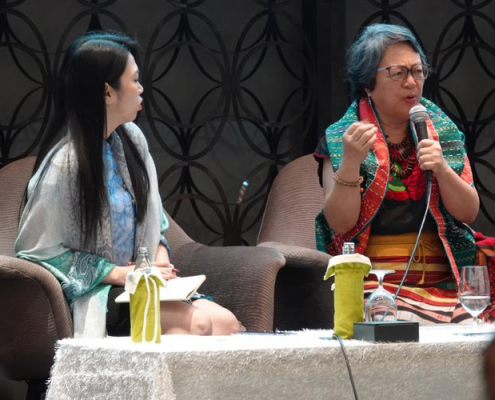Global Priorities
Mechanisms
Development
Peace and Security
Non-Discrimination
Accountability
Participation
During the regional consultation, in Bangkok, in November 2020, Victoria Tauli-Corpuz, the former Special Rapporteur on the rights of indigenous peoples, met with representatives of indigenous peoples’ organizations from Bangladesh, Cambodia, China, India, Indonesia, Lao PDR, Malaysia, Myanmar, Nepal, the Philippines, Thailand, Timor-Leste and Viet Nam. © OHCHR/Todd Pitman
 The voices of indigenous peoples are often excluded from the mainstream conversations where they are most needed. This situation is even more critical in Asia, which is home to more than two-thirds of the world’s indigenous peoples – totalling approximately 400 million.
The voices of indigenous peoples are often excluded from the mainstream conversations where they are most needed. This situation is even more critical in Asia, which is home to more than two-thirds of the world’s indigenous peoples – totalling approximately 400 million.
In an effort to bridge this gap, the UN Human Rights Regional Office for South-East Asia partnered with the Asia Indigenous Peoples Pact (AIPP) and the Indigenous Peoples’ International Centre for Policy Research and Education to hold a regional consultation, in November 2019. The conference brought together more than 100 representatives of indigenous peoples, including academics, lawyers and representatives of CSOs from across Asia. Inputs gathered during the meeting were instrumental in the preparation of the report of the Special Rapporteur on the rights of indigenous peoples. The report was presented to the Human Rights Council, in September.
To continue these discussions, UN Human Rights collaborated with the Special Rapporteur and the AIPP to deliver two webinars, on 30 October and 26 November, during which the Special Rapporteur briefed indigenous representatives on the report’s findings and a plan to implement its recommendations.
The webinars focused on land rights, climate change, the environment and HRDs and provided a meaningful platform for participants to engage with the Special Rapporteur.
The online sessions “proved timely and were very much needed,” said Alice Mathew, a native of Malaysian Borneo and the Regional Office’s Senior Indigenous Fellow. “It is crucial to keep up the momentum and amplify indigenous voices, particularly in Asia,” she added. “We need more dialogue spaces with different stakeholders to exchange experiences, highlight challenges and share our best practices for solutions. While the richness and effectiveness of in-person discussions with the Special Rapporteur may not be replaced by online platforms, they give indigenous peoples direct access to the Special Rapporteur, humanize the UN mechanisms and offer a platform to exchange information and find joint solutions to the challenges we face. We cannot build back better unless the voices of indigenous peoples are heard.”
A final webinar in the series, focused on sustainable development, will be held in 2021.